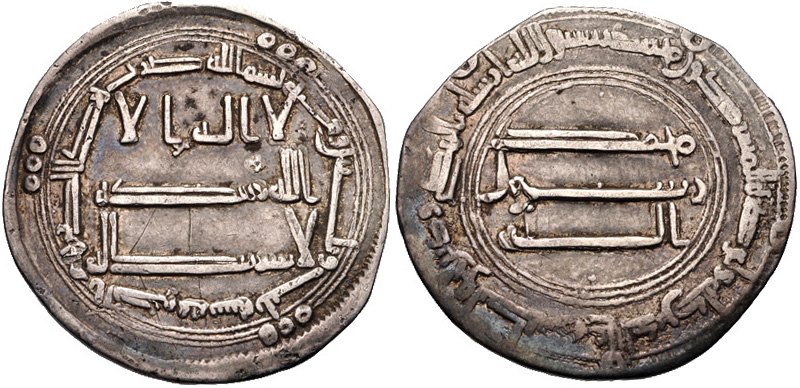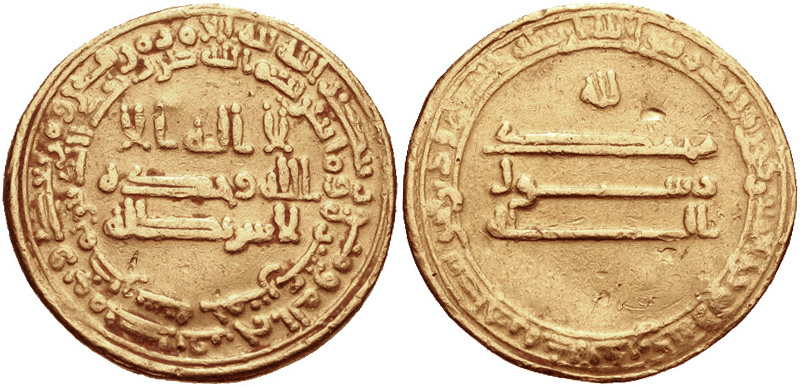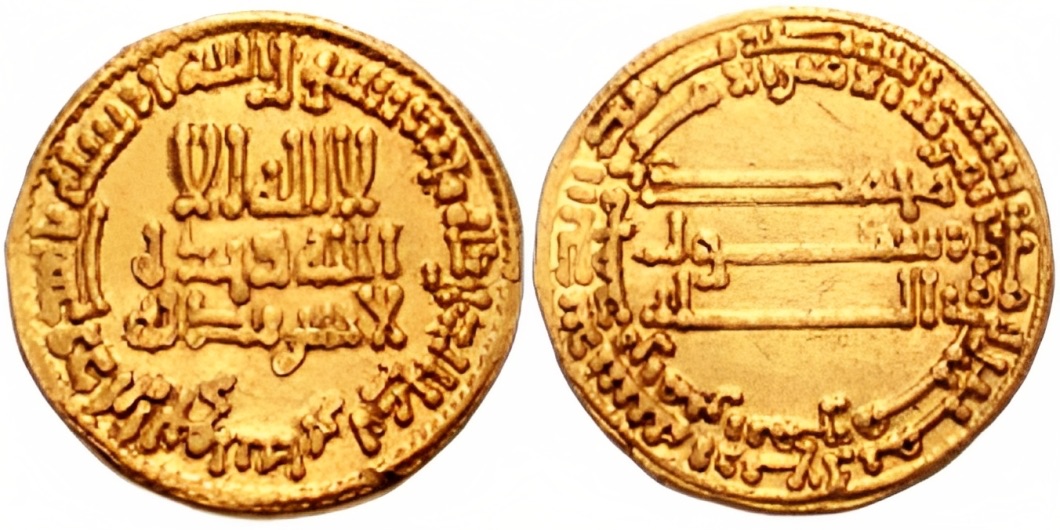|
Al-Ma'mun
Abu al-Abbas Abdallah ibn Harun al-Rashid ( ar, أبو العباس عبد الله بن هارون الرشيد, Abū al-ʿAbbās ʿAbd Allāh ibn Hārūn ar-Rashīd; 14 September 786 – 9 August 833), better known by his regnal name Al-Ma'mun ( ar, المأمون, al-Maʾmūn), was the seventh Abbasid caliph, who reigned from 813 until his death in 833. He succeeded his half-brother al-Amin after a civil war, during which the cohesion of the Abbasid Caliphate was weakened by rebellions and the rise of local strongmen; much of his domestic reign was consumed in pacification campaigns. Well educated and with a considerable interest in scholarship, al-Ma'mun promoted the Translation Movement, the flowering of learning and the sciences in Baghdad, and the publishing of al-Khwarizmi's book now known as "Algebra". He is also known for supporting the doctrine of Mu'tazilism and for imprisoning Imam Ahmad ibn Hanbal, the rise of religious persecution ('' mihna''), and for the ... [...More Info...] [...Related Items...] OR: [Wikipedia] [Google] [Baidu] |
Fourth Fitna
The Fourth Fitna or Great Abbasid Civil War resulted from the conflict between the brothers al-Amin and al-Ma'mun over the succession to the throne of the Abbasid Caliphate. Their father, Caliph Harun al-Rashid, had named al-Amin as the first successor, but had also named al-Ma'mun as the second, with Khurasan granted to him as an appanage. Later a third son, al-Qasim, had been designated as third successor. After Harun died in 809, al-Amin succeeded him in Baghdad. Encouraged by the Baghdad court, al-Amin began trying to subvert the autonomous status of Khurasan, and al-Qasim was quickly sidelined. In response, al-Ma'mun sought the support of the provincial élites of Khurasan and made moves to assert his own autonomy. As the rift between the two brothers and their respective camps widened, al-Amin declared his own son Musa as his heir and assembled a large army. In 811, al-Amin's troops marched against Khurasan, but al-Ma'mun's general Tahir ibn Husayn defeated them in the Battl ... [...More Info...] [...Related Items...] OR: [Wikipedia] [Google] [Baidu] |
Al-Mu'tasim
Abū Isḥāq Muḥammad ibn Hārūn al-Rashīd ( ar, أبو إسحاق محمد بن هارون الرشيد; October 796 – 5 January 842), better known by his regnal name al-Muʿtaṣim biʾllāh (, ), was the eighth Abbasid caliph, ruling from 833 until his death in 842. A younger son of Caliph Harun al-Rashid (r. 786–809), he rose to prominence through his formation of a private army composed predominantly of Turkic slave-soldiers (, sing. ). This proved useful to his half-brother, Caliph al-Ma'mun, who employed al-Mu'tasim and his Turkish guard to counterbalance other powerful interest groups in the state, as well as employing them in campaigns against rebels and the Byzantine Empire. When al-Ma'mun died unexpectedly on campaign in August 833, al-Mu'tasim was thus well placed to succeed him, overriding the claims of al-Ma'mun's son al-Abbas. Al-Mu'tasim continued many of his brother's policies, such as the partnership with the Tahirids, who governed Khurasan and Ba ... [...More Info...] [...Related Items...] OR: [Wikipedia] [Google] [Baidu] |
Al-Amin
Abu Musa Muhammad ibn Harun al-Rashid ( ar, أبو موسى محمد بن هارون الرشيد, Abū Mūsā Muḥammad ibn Hārūn al-Rashīd; April 787 – 24/25 September 813), better known by his laqab of Al-Amin ( ar, الأمين, al-Amīn), was the sixth Arab Abbasid caliph from 809 to 813. Al-Amin succeeded his father, Harun al-Rashid, in 809 and ruled until he was deposed and killed in 813, during the civil war by his half-brother, al-Ma'mun. Early life and the issue of succession Muhammad, the future al-Amin, was born in April 787 to the Abbasid caliph Harun al-Rashid () and Zubayda, herself descended from the second Abbasid caliph, al-Mansur (). Muhammad had an elder half-brother, Abdallah, the future al-Ma'mun (), who had been born in September 786. However, Abdallah's mother was a Persian slave concubine, and his pure Abbasid lineage gave Muhammad seniority over his half-brother. Indeed, he was the only Abbasid caliph to claim such descent. Already in 792, Har ... [...More Info...] [...Related Items...] OR: [Wikipedia] [Google] [Baidu] |
Al-Amin
Abu Musa Muhammad ibn Harun al-Rashid ( ar, أبو موسى محمد بن هارون الرشيد, Abū Mūsā Muḥammad ibn Hārūn al-Rashīd; April 787 – 24/25 September 813), better known by his laqab of Al-Amin ( ar, الأمين, al-Amīn), was the sixth Arab Abbasid caliph from 809 to 813. Al-Amin succeeded his father, Harun al-Rashid, in 809 and ruled until he was deposed and killed in 813, during the civil war by his half-brother, al-Ma'mun. Early life and the issue of succession Muhammad, the future al-Amin, was born in April 787 to the Abbasid caliph Harun al-Rashid () and Zubayda, herself descended from the second Abbasid caliph, al-Mansur (). Muhammad had an elder half-brother, Abdallah, the future al-Ma'mun (), who had been born in September 786. However, Abdallah's mother was a Persian slave concubine, and his pure Abbasid lineage gave Muhammad seniority over his half-brother. Indeed, he was the only Abbasid caliph to claim such descent. Already in 792, Har ... [...More Info...] [...Related Items...] OR: [Wikipedia] [Google] [Baidu] |
House Of Wisdom
The House of Wisdom ( ar, بيت الحكمة, Bayt al-Ḥikmah), also known as the Grand Library of Baghdad, refers to either a major Abbasid public academy and intellectual center in Baghdad or to a large private library belonging to the Abbasid caliphs during the Islamic Golden Age. The House of Wisdom was founded either as a library for the collections of the Caliph Harun al-Rashid in the late 8th century (then later turned into a public academy during the reign of al-Ma'mun) or was a private collection created by al-Mansur (reign 754–775) to house rare books and collections of poetry in Arabic. The House of Wisdom and its contents were destroyed in the Siege of Baghdad in 1258, leaving relatively limited archaeological evidence for the House of Wisdom, such that most knowledge about it is derived from the works of contemporary scholars of the era such as al-Tabari and Ibn al-Nadim. Background The House of Wisdom existed as a part of the major Translation Movement t ... [...More Info...] [...Related Items...] OR: [Wikipedia] [Google] [Baidu] |
Al-Abbas Ibn Al-Ma'mun
Al-Abbas ibn al-Ma'mun () (died 838 CE) was an Abbasid prince and general, the son of the Abbasid caliph al-Ma'mun (). A distinguished military leader in the Arab–Byzantine wars, he was passed over in the succession in favour of his uncle al-Mu'tasim (). In 838, he was arrested for his involvement in a failed conspiracy against al-Mu'tasim, and died in prison. Biography Abbas was the son of al-Ma'mun by the concubine Sundus. In 828–829, al-Ma'mun appointed him as governor of Upper Mesopotamia and the Mesopotamian military frontier zone ('' thughur'') with the Byzantine Empire. Abbas distinguished himself in the expeditions against Byzantium for his bravery. In the summer of 830, Abbas led an expedition against the Khurramite rebels of Babak Khorramdin in Azerbaijan. The campaign was accompanied by a contingent of Byzantine captives under the renegade general Manuel the Armenian, who, given Abbas's relative inexperience, may have been the actual commander of the army. Abbas' ... [...More Info...] [...Related Items...] OR: [Wikipedia] [Google] [Baidu] |
Mu'tazilism
Muʿtazila ( ar, المعتزلة ', English: "Those Who Withdraw, or Stand Apart", and who called themselves ''Ahl al-ʿAdl wa al-Tawḥīd'', English: "Party of ivineJustice and Oneness f God); was an Islamic group that appeared in early Islamic history and were known for their neutrality in the dispute between Alī and his opponents after the death of the third caliph, Uthman. By the 10th century CE the term had also come to refer to an Islamic school of speculative theology (kalām) that flourished in Basra and Baghdad (8th–10th century).Mutazilah ", ''''. The later Mu'tazila school developed an |
Mu'tazila
Muʿtazila ( ar, المعتزلة ', English: "Those Who Withdraw, or Stand Apart", and who called themselves ''Ahl al-ʿAdl wa al-Tawḥīd'', English: "Party of ivineJustice and Oneness f God); was an Islamic group that appeared in early Islamic history and were known for their neutrality in the dispute between Alī and his opponents after the death of the third caliph, Uthman. By the 10th century CE the term had also come to refer to an Islamic school of speculative theology (kalām) that flourished in Basra and Baghdad (8th–10th century).Mutazilah ", ''''. The later Mu'tazila school developed an |
Umm Isa Bint Musa Al-Hadi
Umm ʿĪsā bint Mūsā al-Hādī ( ar, أم عيسى بنت موسى الهادي) was the Abbasid princess, daughter of caliph al-Hadi, niece of caliph Harun al-Rashid and principal wife of the seventh Abbasid caliph al-Ma'mun. Umm Isa was the daughter of Al-Hadi () from one of his concubine. She was born around 783 or 785. She spend her childhood in Baghdad. She was a young child when her father died in 786. Her father was succeeded by her uncle Harun al-Rashid. Her uncle took care of her and her brother after al-Hadi's death. Al-Ma'mun married his first wife Umm Isa, the daughter of his uncle al-Hadi, whom he married when he was eighteen years old. They had two sons, Muhammad al-Asghar, and Abd Allah. This marriage was arranged during Harun al-Rashid's reign. Also, The two sons of al-Hadi, Isma'il and Ja'far married Harun-Rashid's daughters, Hamdunah and Fatimah respectively. Thus, the two daughters of Harun were also cousins and sister-in-laws of Umm Isa. She lived a seclude ... [...More Info...] [...Related Items...] OR: [Wikipedia] [Google] [Baidu] |
Harun Al-Rashid
Abu Ja'far Harun ibn Muhammad al-Mahdi ( ar , أبو جعفر هارون ابن محمد المهدي) or Harun ibn al-Mahdi (; or 766 – 24 March 809), famously known as Harun al-Rashid ( ar, هَارُون الرَشِيد, translit=Hārūn al-Rashīd) was the fifth Abbasid caliph of the Abbasid Caliphate, reigning from September 786 until his death. His reign is traditionally regarded to be the beginning of the Islamic Golden Age. His epithet "al-Rashid" translates to "the Orthodox", "the Just", "the Upright", or "the Rightly-Guided". Harun established the legendary library Bayt al-Hikma ("House of Wisdom") in Baghdad in present-day Iraq, and during his rule Baghdad began to flourish as a world center of knowledge, culture and trade. During his rule, the family of Barmakids, which played a deciding role in establishing the Abbasid Caliphate, declined gradually. In 796, he moved his court and government to Raqqa in present-day Syria. A Frankish mission came to offer ... [...More Info...] [...Related Items...] OR: [Wikipedia] [Google] [Baidu] |
Buran Bint Al-Hasan Ibn Sahl
Buran bint al-Hasan ibn Sahl ( ar, بوران بنت الحسن بن سهل; 6 December 807 – 21 September 884) also known as Khadija bint al-Hasan ibn Sahl (), was one of the wives of the Abbasid caliph Al-Ma'mun. Buran was al-Ma'mun's second wife, She was the daughter of al-Ma'mun's officer, al-Hasan ibn Sahl. She was born as Khadija. She was born on 6 December 807. She was the daughter of al-Hasan ibn Sahl, a senior official of al-Ma'mun, and likely named after the Sasanian queen Boran (). She was betrothed to the Caliph at the age of ten. The wedding took place when she was seventeen, in December 825, at Wasit. The wedding was so pompously celebrated that it became proverbial and was called by the name of “The Invitation of Islam”, . Al-Ma'mun married her in 817, and consummated marriage with her in December 825-January 826 in the town of Fam al-Silh. Buran entered the Caliph's Harem and became one of three wives of the caliph. Living a secluded life in the harem, on ... [...More Info...] [...Related Items...] OR: [Wikipedia] [Google] [Baidu] |
Abbasid
The Abbasid Caliphate ( or ; ar, الْخِلَافَةُ الْعَبَّاسِيَّة, ') was the third caliphate to succeed the Islamic prophet Muhammad. It was founded by a dynasty descended from Muhammad's uncle, Abbas ibn Abdul-Muttalib (566–653 CE), from whom the dynasty takes its name. They ruled as caliphs for most of the caliphate from their capital in Baghdad in modern-day Iraq, after having overthrown the Umayyad Caliphate in the Abbasid Revolution of 750 CE (132 AH). The Abbasid Caliphate first centered its government in Kufa, modern-day Iraq, but in 762 the caliph Al-Mansur founded the city of Baghdad, near the ancient Babylonian capital city of Babylon. Baghdad became the center of science, culture and invention in what became known as the Golden Age of Islam. This, in addition to housing several key academic institutions, including the House of Wisdom, as well as a multiethnic and multi-religious environment, garnered it a worldwide rep ... [...More Info...] [...Related Items...] OR: [Wikipedia] [Google] [Baidu] |






_-_BAE09705.jpg)

.jpg)